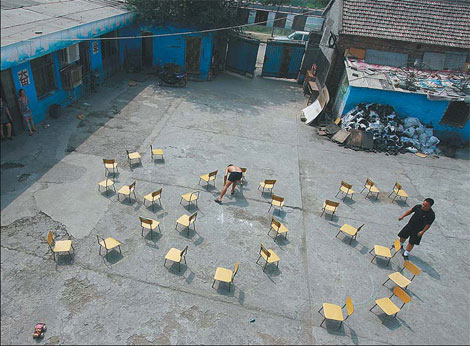School closure leaves 750 children stranded
 0 Comment(s)
0 Comment(s) Print
Print E-mail
China Daily, August 4, 2011
E-mail
China Daily, August 4, 2011
Hundreds of students in Haidian district, many of them the children of migrant workers, could be left without a school at the start of the new academic year, as their classrooms have been condemned by safety authorities.
Cadres in Shu village are refusing to let the privately run Luyuan Primary School renew its lease on buildings it has used since 2005 due to concerns about the standard of its basic facilities, said principal Zhang Xiaohu.
So far, the district's education commission has failed to come up with a solution to the problem of where the 750 enrolled students will be taught, and parents are starting to worry.
The school, which was established in 1995, was given the order to move out just before the end of last semester after an official inspection found the building and infrastructure were unsafe.
The building was previously a warehouse, which Zhang renovated into a school. He even spent 200,000 yuan ($31,000) this year to fit the classrooms with air conditioners and a heating system.
Despite these investments, the classrooms were only divided by wooden boards, the ceiling was coming apart and electric wires were exposed on the roof.
"I was going to furnish the building and fix all the safety problems, but now there is no point," Zhang said.
The other private primary school in the village, the Jingyu Hope Primary, is probably in worse condition, Zhang said.
However, as that school rents its building from private owners, it has not been told to fix the problems or close down.
According to Wang Shuyou, the headmaster of the Jingyu school, the other school's problem stems from the fact that the village committee does not want to take the risk of leasing the building to the school.
"The village elected a new Party secretary last year and he certainly understands that if there is a safety problem the village committee will be responsible."
Legal experts supported Wang's comments.
"It is the landlord's responsibility to make sure that the building he leases is free of safety problems," Chen Wei, a lawyer at Yingke Law Firm, told China Daily. "Otherwise the landlord is legally forbidden to lease the house.
"If there is an accident caused by a safety problem at the building, he will be primarily responsible."
Wang said he learned a year ago that the local education committee planned to close the Luyuan School.
"I believe the education committee is prepared enough to relocate these students," he said.
A spokesman for Haidian's education committee could not be reached for comment on Wednesday.
Wang denied that his school was ready to accept a large number of students from Zhang's school. "The number of students in a class right now is decided by the standard, which is 1.1 square meters a student."
Beijing News quoted a township official, surnamed Luo, as saying the government is willing to help relocate students from Luyuan School to public schools near the village by providing certificates for temporary study to the children of migrant workers.
For many children of migrant workers, public schools are an expensive option.
"Public primary schools are seemingly free, but you have to pay 5,000 yuan in the name of sponsorship," said a local grocery store owner, surnamed Shi, whose child goes to Zhang's school. Shi said the sponsorship fee was a significant financial burden.
According to Shi, there is little choice for the children of migrant workers like him.
"The classroom is extremely hot in summer, even with an air conditioner," Shi said. "But the closest public school is kilometers away and we need five certificates to get the child enrolled."
Beijing launched a major campaign to crack down on illegal schools for migrant workers in 2006 and closed 58 unauthorized private schools in Haidian, Daxing, Fengtai and Chaoyang districts.
However, private schools for immigrant workers remain a common choice for immigrant workers because of easier entry standards and lower fees.







Go to Forum >>0 Comment(s)